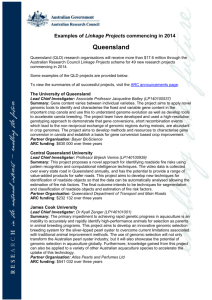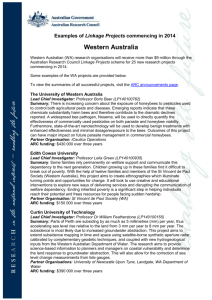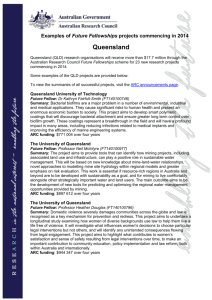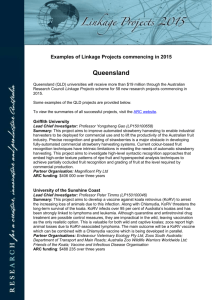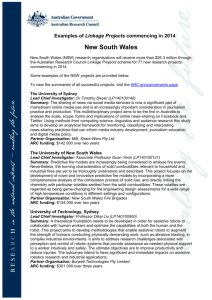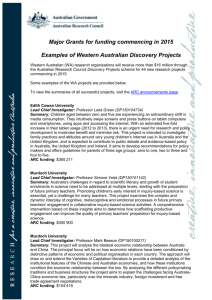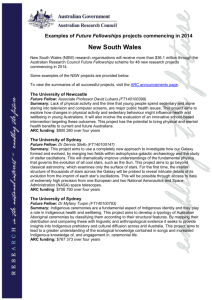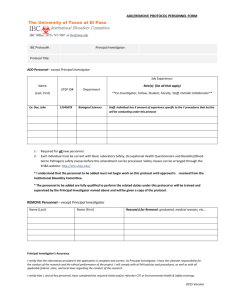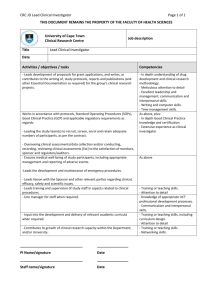Wod Format - Australian Research Council
advertisement
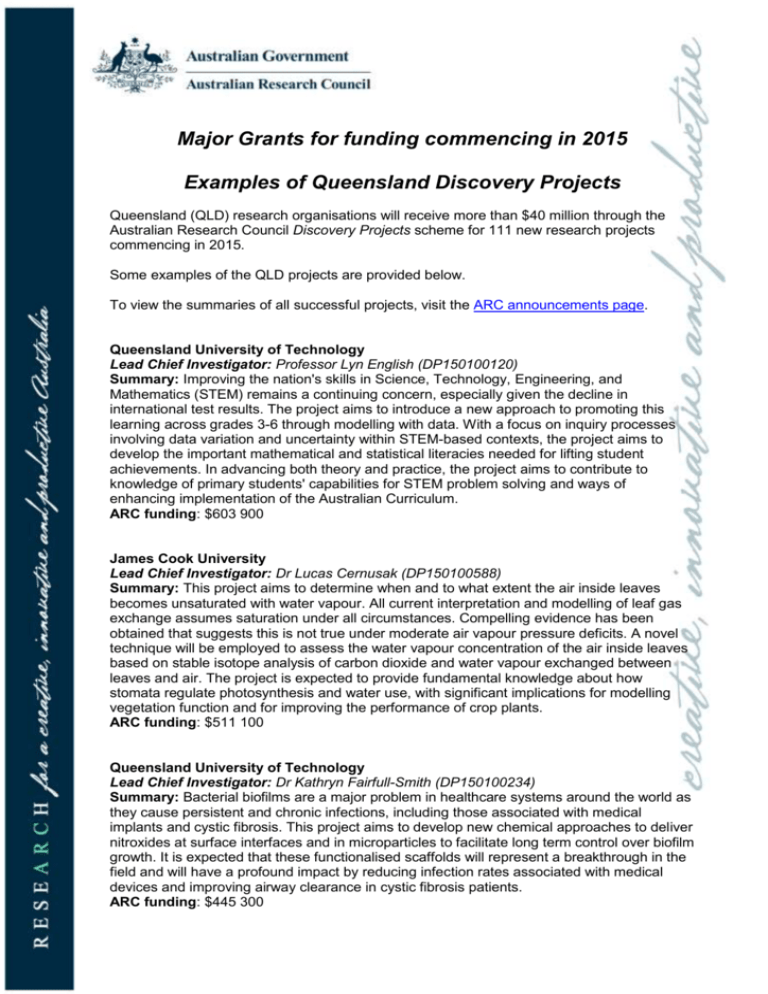
Major Grants for funding commencing in 2015 Examples of Queensland Discovery Projects Queensland (QLD) research organisations will receive more than $40 million through the Australian Research Council Discovery Projects scheme for 111 new research projects commencing in 2015. Some examples of the QLD projects are provided below. To view the summaries of all successful projects, visit the ARC announcements page. Queensland University of Technology Lead Chief Investigator: Professor Lyn English (DP150100120) Summary: Improving the nation's skills in Science, Technology, Engineering, and Mathematics (STEM) remains a continuing concern, especially given the decline in international test results. The project aims to introduce a new approach to promoting this learning across grades 3-6 through modelling with data. With a focus on inquiry processes involving data variation and uncertainty within STEM-based contexts, the project aims to develop the important mathematical and statistical literacies needed for lifting student achievements. In advancing both theory and practice, the project aims to contribute to knowledge of primary students' capabilities for STEM problem solving and ways of enhancing implementation of the Australian Curriculum. ARC funding: $603 900 James Cook University Lead Chief Investigator: Dr Lucas Cernusak (DP150100588) Summary: This project aims to determine when and to what extent the air inside leaves becomes unsaturated with water vapour. All current interpretation and modelling of leaf gas exchange assumes saturation under all circumstances. Compelling evidence has been obtained that suggests this is not true under moderate air vapour pressure deficits. A novel technique will be employed to assess the water vapour concentration of the air inside leaves based on stable isotope analysis of carbon dioxide and water vapour exchanged between leaves and air. The project is expected to provide fundamental knowledge about how stomata regulate photosynthesis and water use, with significant implications for modelling vegetation function and for improving the performance of crop plants. ARC funding: $511 100 Queensland University of Technology Lead Chief Investigator: Dr Kathryn Fairfull-Smith (DP150100234) Summary: Bacterial biofilms are a major problem in healthcare systems around the world as they cause persistent and chronic infections, including those associated with medical implants and cystic fibrosis. This project aims to develop new chemical approaches to deliver nitroxides at surface interfaces and in microparticles to facilitate long term control over biofilm growth. It is expected that these functionalised scaffolds will represent a breakthrough in the field and will have a profound impact by reducing infection rates associated with medical devices and improving airway clearance in cystic fibrosis patients. ARC funding: $445 300 The University of Queensland Lead Chief Investigator: Dr Vinh Dao (DP150102354) Summary: Thermal loading experienced by concrete samples in conventional tests cannot be accurately and independently controlled. This project, through using a novel thermal loading technique, aims to re-examine the performance of concrete in fire. By establishing the heat-flux as a parameter of study, concrete performance under a wide range of fire conditions is expected to be better quantified, eventually leading to a reliable performancebased design of concrete structures. Expected outcomes include improved understanding of concrete performance under combined fire and other loadings, appropriate mathematical models for fundamental concrete properties and constitutive relations, and design recommendations for concrete performance under real fire exposures. ARC funding: $286 300 Griffith University Lead Chief Investigator: Professor Susan Berners-Price (DP150100308) Summary: Proteoglycans and their associated enzymes are significant emerging drug targets of high biological relevance. This project explores a new approach to drug design based on high affinity binding to carbohydrates by polynuclear platinum compounds. Nuclear magnetic resonance spectroscopy studies will be used to delineate structure-activity relationships and the novel technique nano-scale secondary ion mass spectrometry will be developed to explore the mechanism of cellular uptake and sub-cellular distribution. The results will provide mechanistic understanding underpinning the future development of dual-action platinum anticancer drugs with both DNA binding and anti-angiogenic activity. ARC funding: $473 400 The University of Queensland Lead Chief Investigator: Dr Ilana Mushin (DP150100113) Summary: An enduring problem in Indigenous schooling is the discrepancy in outcomes compared to mainstream children, but little is known about one crucial factor: the role of Indigenous ways of speaking and their ways of engaging with knowledge and learning. This ground-breaking project aims to compare preparatory school students in two urban settings: a mainstream school and a school with high Indigenous enrolments. The project also seeks to examine learning in children's homes to establish how the flow of knowledge is managed in Indigenous and mainstream families. By investigating these four settings, it is expected to provide important evidence for understanding how language and cultural ways of knowing contribute to the discrepancy in schooling outcomes. ARC funding: $204 500 University of the Sunshine Coast Lead Chief Investigator: Dr Adam Polkinghorne (DP150101485) Summary: Chlamydial infection of the eyes is a significant cause of disease and death in koalas, contributing to the ongoing decline of this native species. Little is known about what influences the outcome of these infections, challenging efforts to manage and control koala chlamydial blindness. This project aims to evaluate whether differences in the infecting Chlamydia pecorum strains or the koala immune response, are associated with the outcome of chlamydial ocular infection. In addition to helping us to understand and prevent blindness in koalas, this project should significantly expand our knowledge of the koala immune system and generate an array of koala immunological assays, outcomes that may benefit all koala conservation efforts. ARC funding: $458 600 Queensland University of Technology Lead Chief Investigator: Professor David Thambiratnam (DP150100814) Summary: Ongoing increases in the number of level crossings and heavy road vehicles cause more frequent and severe level crossing accidents and derailments. Despite the use of active warning systems, each year, on average, 100 level crossing accidents occur in Australia. With a view to mitigating these crashes, this research aims to formulate theories for reduction in crash energy and effective wheel constraints to prevent derailment by modifying the levels of road and rail crossings and providing guard rails in the recesses of these modified level crossings. The theories are intended to be developed using nonlinear dynamic computational methods and laboratory experiments. The outcomes are expected to enable reduction in the severity of level crossing accidents and hence save lives and costs of derailment. ARC funding: $315 500 Central Queensland University Lead Chief Investigator: Professor Sally Ferguson (DP150104497) Summary: The aim of the project is to assess the impact 'on-call' work has on sleep, stress, and next day performance. Two million Australians are on-call providing essential 24-hour services including emergency response. While sleep during on-call periods is disrupted when a call occurs, some research suggests that sleeping with one ear open waiting for a call may disrupt sleep even if no call occurs. If on-call sleep is less restorative, then individuals are at risk of performance impairment and adverse health outcomes. This project aims to answer questions about the magnitude of sleep disruption when on-call, the mechanisms for any disruption, and impact on waking function. ARC funding: $236 700 The University of Queensland Lead Chief Investigator: Dr Robin Fitzgerald (DP150100569) Summary: Serious crimes committed by parolees in Australia have brought parole into the public eye. Without concrete evidence, governments often act on the assumption that the public holds punitive attitudes. This project is expected to develop an evidence base to inform policy on parole at a crucial time when governments are under pressure to restrict its use. Three mixed-method studies aim to assess: what public views on parole are; why the public holds these views; and what influence these views have on policy and practice. The project is expected to make contributions to: creating information strategies that properly inform the public; supporting prisoner reintegration strategies; and shaping criminal justice policies based on informed community feedback. ARC funding: $235 780
